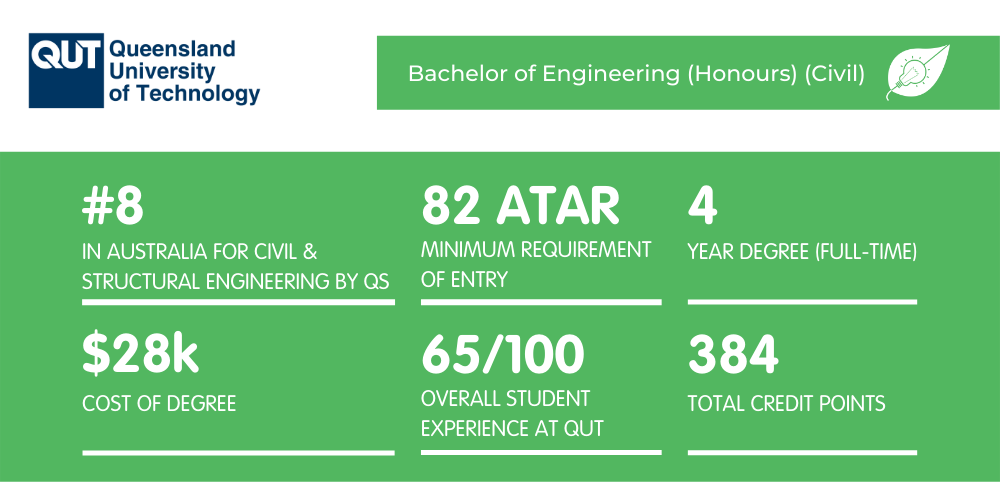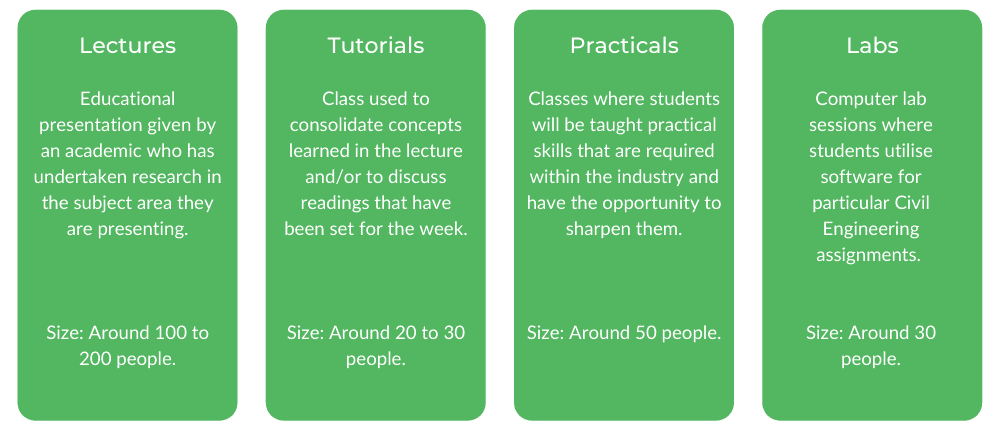Wondering whether studying a Bachelor of Engineering (Honours) (Civil) at QUT is the right choice for you?
You’ve come to the right place as we give you the run-down on everything you need to know about the degree, including the subjects, assessments, culture, staff and more!
Let’s dive in!
What is a Bachelor of Engineering (Honours) (Civil) at QUT?
Core Units and Majors
How to Get into Civil Engineering at QUT
What’s the Teaching Format?
What’s the Faculty and Culture Like?
What is a Bachelor of Engineering (Honours) (Civil) at QUT?
A Bachelor of Engineering (Honours) (Civil) at QUT is a 4-year degree that provides you with real-world, hands-on learning to develop your expertise for the workplace. You will work in an innovative learning environment to build your knowledge of planning, designing, constructing, operating, and maintaining various infrastructures for the community.
As Honours is integrated within the degree, you will graduate with an advanced skill set and higher-level qualifications to give you a professional step-up in the industry.
Who should study a Bachelor of Engineering (Honours) (Civil)?
This degree is well suited to students interested in innovative design, passionate about environmental sustainability, and looking for a very hands-on learning experience.
If you’re studying Mathematical Methods or Specialist Mathematics, Physics, Chemistry or Design, a Civil Engineering degree may be just what you’re looking for!
Can you study it with another degree?
If you’re looking to expand your career options, you can combine a Bachelor of Engineering (Honours) at RMIT with any of the following areas:
- Business
- Architecture
- Landscape Architecture
- IT
- Mathematics
- Science
Career Paths
A Bachelor of Engineering (Honours) (Civil) is an open-ended degree that allows you to pursue careers in various industries, whether that be through areas like structural engineering, water engineering, geotechnical engineering, or transport engineering.
Some of the different roles that you can pursue include:
- Civil Engineer
- Technical Director
- Construction Supervisor
- Urban Designer
- Sustainability Consultant
- Quantity Surveyor
Learn about other roles you can pursue with a Bachelor of Engineering here!
Core Units and Majors
What are the Core Units?
In your first year, you need to complete four core units worth 48 credit points that introduce you to foundational engineering concepts.
Energy in Engineering Systems develops your understanding of the interaction and transfer of energy in engineering systems, while Engineering Sustainability and Professional Practice introduces you to the concept of sustainability and its impact on current and future engineering challenges.
What’s a Civil Engineering major like?
A Civil Engineering major consists of 192 credit points, with 8 major units and 8 honours-level units. The major is highly varied among the different sub-strands, enabling you to explore different areas of civil engineering like traffic and transport, water, electrical, mechanical, geotechnical, and concrete structures.
If you’re interested in mathematical concepts, Computational Explorations and Structural Mechanics develop your essential knowledge of using real-world systems for analysis, while subjects like Principles of Construction build on your understanding of practicality, environmental effects, and safety.
“There is great variability in the Civil Engineering Major, but most subjects are pretty heavily mathematically based, as well as having a lot of theoretical components.” — Jarrad Ng, Bachelor of Engineering (Honours) (Civil) III at QUT
Work Experience
With a strong focus on delivering practical, real-world experience, the Work Integrated Learning Program is a core component of the degree that requires students to complete 60 days of work experience in the engineering environment to develop their professional expertise.
How to Get into Civil Engineering at QUT
The ATAR guarantee for entry in a Bachelor of Engineering (Honours) (Civil) at QUT is 82. If you aren’t too familiar with the ATAR system in Queensland, you can learn all about it here!
Assumed Knowledge
Before beginning this degree, students are expected to have an assumed knowledge in these areas:
- English, or Literature, or English and Literature Extension, or English as an Additional Language (Units 3 & 4, C)
- Mathematical Methods, or Specialist Mathematics (Units 3 & 4, C)
Pathway Programs
If you don’t meet the ATAR requirements for a Bachelor of Engineering (Honours) (Civil) at QUT, have no fear!
You can receive entry into the course by completing a QUT College Diploma in Engineering or enrolling in the TAFE Queensland Brisbane/QUT award and completing either an Advanced Diploma of Engineering or an Associate Degree in Civil Engineering.
Upon completing either the QUT College Diploma or the TAFE Queensland courses, you will receive a 1-year credit transfer to complete your degree in 3 years.
What scholarships are available?
QUT has numerous scholarships on offer to support domestic and international students with financial support throughout their studies.
The Science and Engineering Financial Hardship Scholarship is valued at $5,000 to support students experiencing financial hardship. The Women in Engineering Scholarship is valued at $6,000 to assist high achieving female students.
What’s the Teaching Format?
A Bachelor of Engineering (Honours) (Civil) at QUT is delivered across two semesters per year:
- Semester 1: February to June
- Semester 2: July to November
Class Structure
Lectures
Lectures usually run for 2 hours per week and typically have a few hundred people in attendance.
Lectures are formal sit-downs where a lecturer, typically the subject coordinator, will go through the concepts and theories of the current week in preparation for tutorials.
Tutorials
Tutorials run for 2 hours and usually have around 20 to 30 people in a classroom. In tutorials, you can expect to go through the theoretical principles introduced in your lecture and break down the concepts by answering problem-solving questions.
Tutorials are also an excellent opportunity to ask your tutor about any questions you might have relating to your work or any upcoming assessment.
Practicals
Practicals vary from early years to later years, usually occurring around 1-2 times per week at the beginning of your degree and approximately 3-4 times per semester towards the end.
Practicals typically run for 2 hours and support the theoretical content with a hands-on activity. These classes generally have around 50 students in attendance.
Computer Labs
While computer labs are not as common in Civil Engineering and are mostly reserved for mathematical units, they offer a practical, hands-on way to work with the software concerning an assignment. They usually run for 2 hours and have around 30 people in a class.
How much time do you spend on campus?
If you study a Bachelor of Engineering (Honours) (Civil) at QUT, you’ll usually take four subjects per semester on a full-time load. That means you’re looking at around 20-25 hours per week.
However, this is generally towards the beginning of your degree as early units have significantly more hours to acclimate school students to university. As you progress through your degree, the workload becomes more content-heavy, and contact hours usually decrease to approximately 15 hours per week.
What are the assessments like?
In your early years, assessments are heavily weighted toward practical assessments, usually involving laboratory experiments relevant to a real-world context to evaluate your ability to problem-solve, and examinations.
In your later years, assessments are more heavily weighted towards assignment-based assessments, such as technical reports, which could be worth 60%, while final examinations are worth 40%.
You are often given a month or more to complete your report, which involves being presented with a topic, receiving a brief, and then conducting extensive research to format a technical report. Written examinations typically follow a short-format response and are usually based on solving mathematical problems.
What skills do you develop?
Throughout studying a Bachelor of Engineering (Honours) (Civil) at QUT, you will develop the technical skills and design knowledge to problem-solve and find innovative solutions to major engineering projects.
In a workplace that will often involve facing complex challenges, the ability to effectively identify, analyse and problem-solve is critical for Civil Engineers to have as confident decision-makers. The communication skills that you build through various teamwork assessments are essential for ensuring that you can explain detailed technical information and give clear directions.
What’s the Faculty and Culture Like?
Faculty
With some of the best lecturers in QUT are allocated to the early first and second-years units, the teaching staff in the early years of a Bachelor of Engineering (Honours) (Civil) boost an overall good experience with students and are very accessible.
However, as you progress throughout your degree, the teaching staff becomes smaller, so it may require a longer wait to hear a response back from them.
Culture
QUT has an incredibly vibrant campus culture, and it’s booming with heaps of opportunities to join societies and clubs, participate in volunteer opportunities and develop your professional skills.
The QUT Civil Engineering Student Society and Engineers Without Borders QUT are two great societies for Engineering students to connect with like-minded people and participate in social, academic, professional and volunteer opportunities.
Resources
As well as the social side, there are plenty of resources available for students to support their learning.
STIMulate is a program where students can receive Maths, Science and IT support from trained student Peer Learning Facilitators through free drop-in assistance in the library, online resources and group support sessions.
Ashley Sullivan is a Content Writer for Art of Smart Education and is currently undertaking a double degree in Communications (Journalism) and a Bachelor of Laws at UTS. Ashley’s articles have been published in The Comma and Central News. She is a film, fashion and fiction enthusiast who enjoys learning about philosophy, psychology and unsolved mysteries in her spare time.






